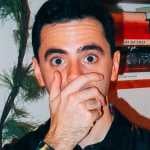
Pike Bishop: I'd like to make one good score and back off...
Dutch Engstrom: Back off to what?
—The Wild Bunch (Peckinpah, 1969)
First and before anything else, that hour of television was magic.
Last night's mid-season finale, "Waterloo," capped off a string of seven very-good-to-great episodes of Mad Men, and brought down the house with a surprise musical number from Bert Cooper. Like a foot run over with a lawnmower, it was the kind of insane sounding moment that few programs attempt, and still fewer pull off. Like the lawnmower, Bert's performance of "The Best Things in Life Are Free," from the 1930 musical Good News, is a complicated mix of tones, at once comedic and full of dread.
Where'd that dread come from? It helps that the second scene of the episode played suicide for laughs, with a very depressed Ted Chaough cutting the engine on his plane with some Sunkist company men on board (one of whom looked like the perfect cross between Don Draper and Pete Campbell, just another instance of uncanny casting this season). Death is never far from Mad Men, but the grim face of Ted last night recalled one very specific demise—Lane Pryce's. But Ted isn't cursed with the dogged determination of an English accountant, and when the money came calling (and when Don explained that a man without work is like a man already dead), he snapped out of his funk and voted to sell 51% of the firm to McCann Erickson.
I keep thinking about the vote, and the familiar faces in that room. The gang rides together again for one last multi-million dollar score. It's not a coincidence that Megan mentions Sam Peckinpah's classic Western The Wild Bunch during her breakup with Don. Don says he hasn't seen the movie yet, but maybe he doesn't have to, as he's kinda living the experience. In Peckinpah's film, a gang of the crustiest of gunslingers do battle with the forces of change in North America, as represented by the railroad, a Mexican warlord, and, memorably, an armed prostitute. The broader translation is something like corporate technology, brown people, and women.

Thematics aside, The Wild Bunch is notorious for its bloody violence, photographed in slow motion. Bullets cut down bodies in detailed displays of exploding viscera, leaping blood, agony like death masks on the faces of men and women collapsing in the street. Mad Men uses slow motion very infrequently, making it significant that there would be just such a sequence in the episode mentioning Peckinpah's movie. The slow motion comes in the seconds before Peggy makes her pitch to Burger Chef. Don, parroting her language about story telling in a significant acknowledgement of respect and guard changing, introduces her to the clients, who were just seconds before shot in slow motion. They become a somewhat grotesque cadre of laughing white men; in Peckinpah's movie, they'd soon be dead. And yes, Peggy slays them with her perfectly calibrated monologue about generational divide, Vietnam, television, and creating a space for family to be together without distraction.

The forever brilliant thing about Mad Men is how these speeches, like Don's Carousel pitch in season one, are always undercut by the fact that they're in service of an advertisement. Because of that, they can never be one-dimensional sentiment. They're stirring, but they also reflect a reality of capitalism: Your feelings, regardless of how deeply or truly you may feel them, can be turned against you to sell you something. Your heart can be the vulnerable path to your pockets, and you will be made to turn them out for some faceless corporation that doesn't really care about your best interests. In Mad Men, we relate to the monologues because they often reflect the failed dreams of the characters delivering them. Peggy's is born from her genuinely moving encounter with Julio, which reminds the viewer of Peggy's own child. She can't have the life that she wants but damn can she work. She's a gifted performer, just like her mentor. She's the heir to Don's genius. The torch will be passed to women now, as Don acknowledges to her in her hotel room the night before the meeting. They should inherit the earth. It's almost a rosy picture.
But lurking behind all of this is money. A transaction. In this case, a fast food restaurant posing as a space of communion and possibly community. Advertising sucks; we all know this. And that's what makes Bert's song so ominous (you know, beyond the fact that Don's hallucinating the singing and dancing of a dead man). "The Moon belongs to everyone," he sings. "The best things in life are free," he warns.
Don begins to tear up. His eyes go red. They have all just collaborated to make money by making a deal with McCann Erickson, a.k.a. the Man in all its corporate machinations and cold, calculating greed. For seasons we've heard about how bad McCann is. Now Roger is inviting them to buy over half of SC&P.
In The Wild Bunch, the gang makes a deal with Mapache, the corrupt Mexican general, only to be betrayed by him. By the film's end, the gang goes down in a hail of gunfire. Joan is a partner, and thus nominally part of the partners gang, but she'll escape whatever fate awaits the men in the final seven episodes. But rest assured that the new world won't be a place for the likes of Don, Roger, Cutler, Pete, and Ted.
Only you need just take a look around in 2014 to see that white men still hold most of the power. But wouldn't it be pretty to think that this really was the end of an era?

Ross Scarano is a deputy editor at Complex. He tweets here.

